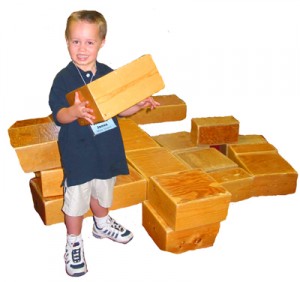They’re Taking Away The Building Blocks
Roberta Michnick Golinkoff, PH.D H. Rodney Sharp Professor School of Education and Departments of Psychology and Linguistics University of Delaware With Kathy Hirsh-Pasek of Temple University, co-author of Einstein Never Used Flash Cards: How Our Children Really Learn and Why they Need to Play More and Memorize Less (2003, Rodale) Excerpt from an editorial in the Wilmington Journal

Newcastle Preschool features an age-appropriate curriculum that balances academics and play.
As one teacher put it, “they’re taking the blocks away!” What is replacing the building blocks? Desks and workbooks! But wait! This is preschool and kindergarten! What happened to playdoh and coloring and duck-duck-goose? What happened to time in the dress up corner and hearing stories? Thirty years of science in the field of child development tells us unequivocally that force-feeding academics to young children is not how they learn best. Thirty years of science tells us that play is the best teacher and PLAY = LEARNING. Yet “play” has become a 4-letter word in our society! This is not to say that children shouldn’t be taught and should be left to roam about the classroom on their own. But pushing preschool children to sit at desks and do workbooks is not the way to teach them – even for those children who have not been fortunate enough to be read to and worked with at home. Underlying the notion that children should be pushed to learn are THREE MYTHS THAT ARE PERPETUATED IN THE MEDIA AND THE MARKETPLACE. FIRST, SOME HOLD THAT FASTER IS BETTER. We put children on the same treadmill that many of us are on! If children learn to read in kindergarten, the thought is that they will outpace their peers as they transition into school. Ironically, however, the research shows that children who are pushed are more anxious about learning and school than children who do age appropriate activities. Children who are pushed often worry that there is one right answer and that they have failed if they can’t find it. This is the way to turn children off to learning, to make them dread coming to school. The educational toy business has capitalized on parents’ anxiety about their children’s achievement. This billion dollar industry works hard to perpetuate the myth that the early introduction of school learning is critical for children’s developing brains. There is no evidence to support that claim. When we pressure our children to learn, all we are doing is confusing memorization with achievement. SECOND, if we engage in “DRILL AND KILL” it will be because we act as if our children are empty vessels, passively waiting for us to fill them up with learning. This popular view contrasts sharply with the portrait painted by researchers who spend countless hours studying how young children develop and learn. To view children as empty vessels who need to be rushed towards adulthood under our educational supervision saps children’s ingenuity. In fact, children are active and creative thinkers, explorers, who are constantly investigating the world around them. We know that young children are like sponges, eager to learn and arriving at school already knowing much about their world. In our interactions with them we need to capitalize on their natural curiosity and present new information in a fun and playful way. As just one example, consider reading. Rather than forcing children to memorize letter names, and trying to get them to learn to read in preschool and kindergarten, children need to be exposed to the wonders of books and writing. They need to be read to, to talk about what they are hearing, and to see lots of books and pictures. Learning about letters and words should be done playfully. Old standards like the alphabet song work, as do rhyming games like removing the initial letter of a child’s name in that old rock-and-roll song, “Nathan, Nathan, bonathan, re-riro- nathan, Nathan!” to give the idea that words are composed of sounds. FINALLY, THERE IS THE MYTH THAT SOCIAL AND EMOTIONAL DEVELOPMENT ARE NOT IMPORTANT, that they can take care of themselves. To the contrary, evidence from laboratories around the world shows that emotional intelligence (EQ) is central to academic success. Children’s ability to get along with peers, to follow directions, and to empathize with others is crucial for their success in school. In the rush to fill their heads with facts and make minutes count academically, we rob children of the playtime they need to learn to negotiate with others and to interact with adults. Remember the category of “works and plays well with others” from our old report cards? Having these skills is the difference between success and failure in the real world! Emotional intelligence is just as important as IQ! Learning how to enter social groups, how to take turns, and how to cooperate are all part of what young children must accomplish to be successful in school and in life. With the best intentions, and if we are not vigilant, preschool and all-day kindergarten will not be a garden where children can grow and thrive but a hothouse where children are forced to sit still and made to feel pressure to perform. Yet scientists have learned a great deal about how children grow and learn. We know how to raise happy, healthy, and intelligent children – even when both parents are in the work force – and it’s not by forcing little ones to sit in chairs and listen. As we explore how best to educate our nation’s youngest citizens, we would be best served by using science as our guide. Young children do not learn through workbooks and flashcards. They learn best through meaningful exploration and play. ITS TIME TO RETURN CHILDHOOD TO CHILDREN AND BRING BACK THE BUILDING BLOCKS!

